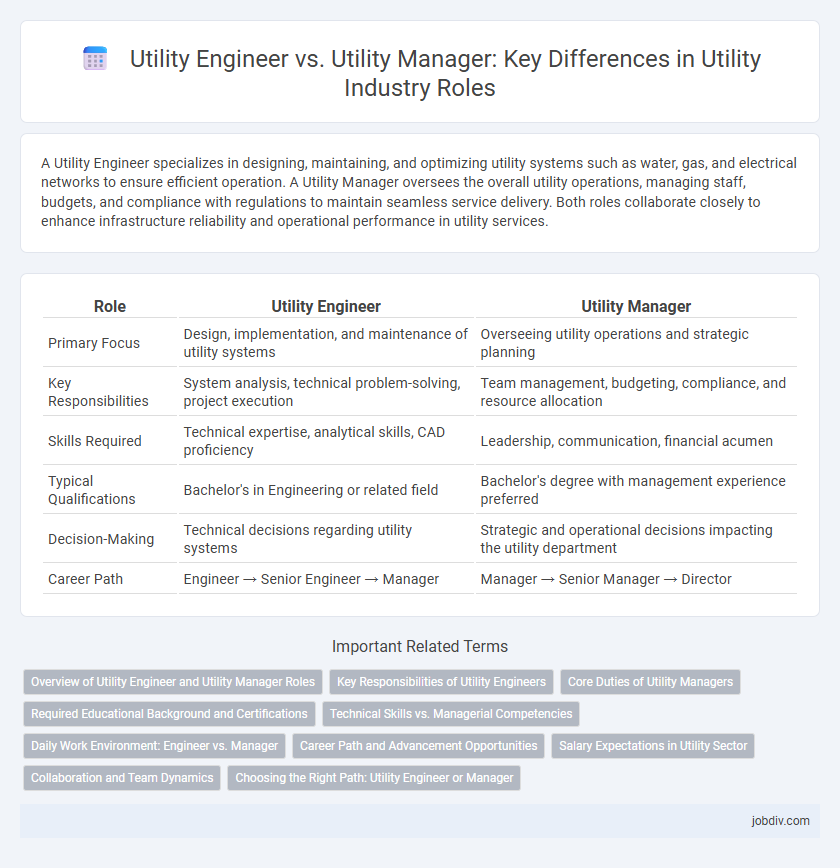A Utility Engineer specializes in designing, maintaining, and optimizing utility systems such as water, gas, and electrical networks to ensure efficient operation. A Utility Manager oversees the overall utility operations, managing staff, budgets, and compliance with regulations to maintain seamless service delivery. Both roles collaborate closely to enhance infrastructure reliability and operational performance in utility services.
Table of Comparison
| Role | Utility Engineer | Utility Manager |
|---|---|---|
| Primary Focus | Design, implementation, and maintenance of utility systems | Overseeing utility operations and strategic planning |
| Key Responsibilities | System analysis, technical problem-solving, project execution | Team management, budgeting, compliance, and resource allocation |
| Skills Required | Technical expertise, analytical skills, CAD proficiency | Leadership, communication, financial acumen |
| Typical Qualifications | Bachelor's in Engineering or related field | Bachelor's degree with management experience preferred |
| Decision-Making | Technical decisions regarding utility systems | Strategic and operational decisions impacting the utility department |
| Career Path | Engineer → Senior Engineer → Manager | Manager → Senior Manager → Director |
Overview of Utility Engineer and Utility Manager Roles
Utility Engineers specialize in designing, maintaining, and optimizing utility systems such as water, electricity, and gas to ensure efficient and reliable service delivery. Utility Managers oversee the operational and strategic aspects of utility services, managing teams, budgets, and regulatory compliance to meet organizational goals. Both roles are critical in maintaining infrastructure, with engineers focusing on technical execution and managers emphasizing leadership and resource management.
Key Responsibilities of Utility Engineers
Utility Engineers primarily design, implement, and maintain essential utility systems such as water, gas, and electrical networks to ensure efficient and reliable service delivery. They conduct technical analyses, troubleshoot operational issues, and optimize system performance by applying engineering principles and regulatory compliance standards. Collaboration with Utility Managers occurs to align engineering projects with organizational goals and ensure infrastructure resilience and sustainability.
Core Duties of Utility Managers
Utility managers oversee the strategic planning, operation, and maintenance of utility systems, ensuring efficient resource management and compliance with regulations. They coordinate teams, budget allocation, and infrastructure projects to optimize service reliability and customer satisfaction. Utility engineers focus more on technical design and problem-solving, while utility managers emphasize leadership, policy implementation, and overall system performance.
Required Educational Background and Certifications
Utility engineers typically require a bachelor's degree in engineering disciplines such as civil, electrical, or mechanical engineering, with certifications like Engineer-in-Training (EIT) or Fundamentals of Engineering (FE) enhancing their credentials. Utility managers often hold advanced degrees such as a master's in business administration (MBA) or engineering management, along with certifications like Project Management Professional (PMP) or Certified Utility Manager (CUM) to demonstrate leadership and operational expertise. Both roles benefit from industry-specific training and continuous professional development to stay current with evolving utility technologies and regulations.
Technical Skills vs. Managerial Competencies
Utility Engineers specialize in technical skills such as system design, maintenance, and troubleshooting of utility infrastructure including electrical, water, and gas systems. Utility Managers focus on managerial competencies like project coordination, resource allocation, team leadership, and compliance with regulatory standards to ensure efficient utility operations. While engineers prioritize technical problem-solving, managers excel in strategic planning and operational oversight.
Daily Work Environment: Engineer vs. Manager
Utility Engineers typically focus on technical problem-solving, system design, and maintenance tasks within power plants or distribution networks, working closely with operational staff. Utility Managers oversee daily operations, coordinate teams, and handle administrative responsibilities such as budgeting and regulatory compliance. Engineers spend more time on-site analyzing system performance, while Managers often engage in strategic planning and stakeholder communication in office settings.
Career Path and Advancement Opportunities
Utility Engineers typically focus on designing, implementing, and maintaining systems related to water, electricity, and gas services, building foundational technical skills essential for career progression. Utility Managers oversee broader operational functions, including team leadership, budgeting, and regulatory compliance, positioning themselves for executive roles within utility companies. Career advancement often transitions from Utility Engineer roles to managerial positions, leveraging both technical expertise and strategic operational experience.
Salary Expectations in Utility Sector
Utility Engineers typically earn between $65,000 and $90,000 annually, reflecting their technical expertise in system design and maintenance within the utility sector. Utility Managers, responsible for overseeing operations and strategic planning, command higher salaries ranging from $90,000 to $130,000, influenced by their leadership roles and management experience. Salary expectations in the utility sector vary based on factors such as geographic location, company size, and individual qualifications.
Collaboration and Team Dynamics
Utility Engineers specialize in technical design and operational efficiency, collaborating closely with field technicians and project managers to ensure seamless utility system performance. Utility Managers oversee multiple teams, integrating cross-functional efforts and aligning resources to meet regulatory compliance and organizational goals. Effective collaboration between both roles enhances problem-solving, optimizes workflow, and drives innovation in utility management.
Choosing the Right Path: Utility Engineer or Manager
Utility Engineers specialize in designing, maintaining, and optimizing infrastructure systems such as water, electricity, and gas supply networks, requiring strong technical skills in engineering principles and problem-solving. Utility Managers oversee the operational, financial, and regulatory aspects of utility services, focusing on team leadership, project management, and customer satisfaction to ensure efficient utility delivery. Choosing the right path depends on whether you prefer hands-on technical work or strategic operational management within the utility sector.
Utility Engineer vs Utility Manager Infographic

 jobdiv.com
jobdiv.com